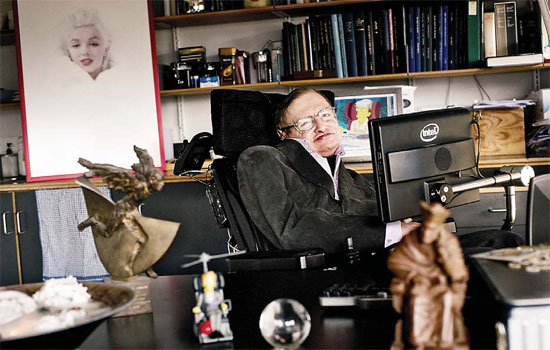
LONDON - When Stephen Hawking was diagnosed with motor neurone disease at the age of 21, he was given only a few years to live. But the British scientist will mark his 70th birthday on Sunday, as inquisitive as ever.
 |
|
British scientist Stephen Hawking in his office at the University of Cambridge. [Photo/China Daily] |
Despite spending most of his life crippled in a wheelchair and able to speak only through a computer, the theoretical physicist's quest for the secrets of the universe has made him arguably the most famous scientist in the world.
"I'm sure my disability has a bearing on why I'm well known," Hawking once said. "People are fascinated by the contrast between my very limited physical powers, and the vast nature of the universe I deal with."
Much of his work has centered on bringing together relativity (the nature of space and time) and quantum theory (how the smallest particles in the universe behave) to explain the creation of the universe and how it is governed.
In 1974, at age 32, he became one of the youngest fellows of Britain's prestigious Royal Society. Five years later he became Lucasian Professor of Mathematics at Cambridge University, a post once held by Isaac Newton.
But it was his 1988 book, A Brief History of Time, explaining the nature of the universe to non-scientists, which brought him international acclaim and sold millions.
Hawking has since become a global star through cameos in Star Trek and The Simpsons, where he tells the rotund Homer Simpson that he likes his theory of a "doughnut-shaped universe", and may have to steal it.
Martin Rees, Britain's Astronomer Royal and a former president of the Royal Society, said he first met Hawking when they were both research students "and it was thought he might not live long enough to finish his PhD degree".
Hawking was just 21 when he was diagnosed with amyotrophic lateral sclerosis (ALS), a form of motor neurone disease that attacks the nerves controlling voluntary movement.
He has admitted that he felt "somewhat of a tragic character" who took to listening to Wagner, but he soon returned to work, securing a fellowship at Cambridge, and married Jane Wilde, with whom he had three children.
Even when his physical condition deteriorated, requiring around-the-clock care, he refused to let it hold him back.
"The human race is so puny compared to the universe that being disabled is not of much cosmic significance," he retorts to questions about his health.
Brian Dickie, research director of the MND Association, says most sufferers live for less than five years and "the fact that Stephen Hawking has lived with the disease for close to 50 years makes him exceptional".
But Rees cautioned on focusing too much on his astonishing story and his fame, when it is his work that will survive in the end.
"His fame should not overshadow his scientific contributions because even though most scientists are not as famous as he is, he has undoubtedly done more than anyone else since Einstein to improve our knowledge of gravity," he said.
Hawking's 70th birthday on Sunday - he was born 300 years to the day after the death of the father of modern science, Galileo Galilei - is being marked by a special symposium at Cambridge focusing on "the state of the universe".
A new exhibition celebrating Hawking's life achievements, featuring papers from his archives, also opens at London's Science Museum on Jan 20.
Hawking retired as Lucasian Professor of Mathematics when he reached 67, but his fascination with the world remains.
He is watching the progress of the Large Hadron Collider closely, having bet $100 in 2009 that it will not find an elusive particle seen as the holy grail of cosmic science, while he has long had the ambition of going into space.
Other mysteries closer to home puzzle him, too.
In an interview with the New Scientist magazine marking his birthday, Hawking - who divorced his second wife in 2006 - was asked what he thought about most during the day, and replied: "Women. They are a complete mystery."
Agence France-Presse